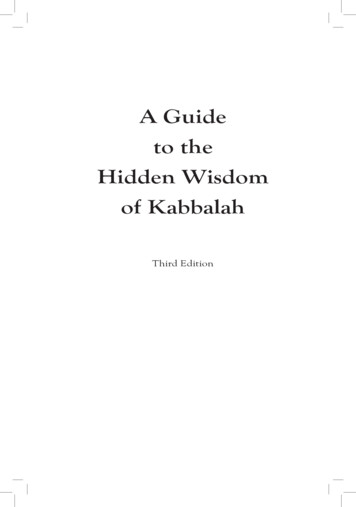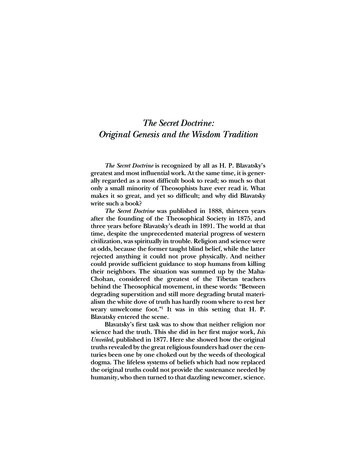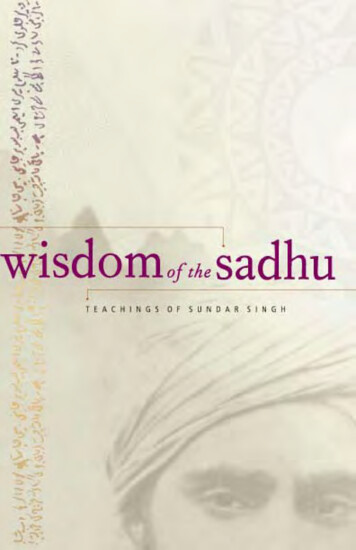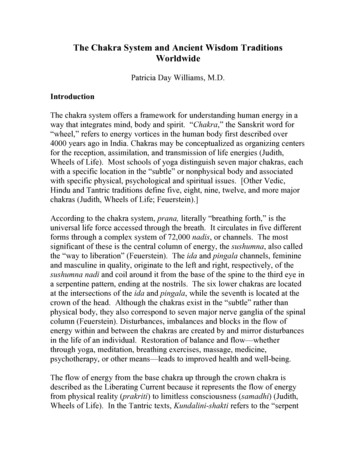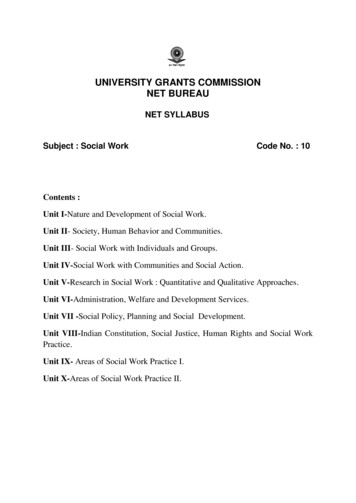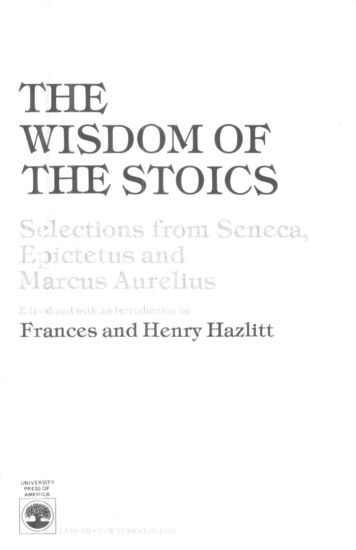
Transcription
WISDOM OFTHE STOICS 'Frances and Henry HazlittUNIVERSITYPRESSOFAMERICA
Copyright 1984, by Frances and Henry HazlittUniversity Press of America, Inc.4720 Boston WayLanham. MD 207063 Henrietta StreetLondon WC2E 8LU EnglandAll rights reservedPrinted in the United States of AmericaLibrary of Congress Cataloging in Publication DataMain entry under title:The Wisdom of the Stoics.1. Stoics—Addresses, essays, lectures. I. Hazlitt,Frances Kanes. II. Hazlitt, Henry, 1894III. Seneca, Lucius Annaeus, ca. 4 B.C.-65. Selections.English. 1984. IV. Epictetus. Selections. English.1984. V. Marcus Aurelius, Emperor of Rome, 121-180.Selections. English. 1984.B528.W54 198418884-3493ISBN 0-8191-3870-3 (alk. paper)ISBN 0-8191-3871-1 (pbk.: alk. paper)All University Press of America books are produced on acid-freepaper which exceeds the minimum standards set by the NationalHistorical Publications and Records Commission.
us: The Enchiridion5.Marcus Aurelius
INTRODUCTIONThe Stoic philosophy was founded by Zeno, aPhoenician (c, 320-c. 250 B.C.), but nothing by himhas come down to us except a few fragmentaryquotations.He was followed by Cleanthes, then But though Chrysippus, for example, issaid to have written 705 books, practically nothingis extant by any of these philosophers except insecond-hand accounts.Only three of the ancientStoics, Seneca, Epictetus, and Marcus Aurelius,survive in complete books.None of the three has ever had a large audience.The history of their reputations is curious. In theseventeenth century Seneca was certainly the bestknown.Then, in the late nineteenth and earlytwentieth century, he was almost completely forgotten, and popularity alternated between Epictetus andMarcus Aurelius.Under the influence of MatthewArnold, the latter became a sort of cultural "must"for mid-Victorians. As an example of what was beingwritten in the early years of this century, I quotefrom one of the self-improvement books written by thenovelist Arnold Bennett:I suppose there are some thousands ofauthors who have written with more orless sincerity on the management ofthe human machine.But the twowhich, for me, stand out easily aboveall the rest are Marcus AureliusAntoninus and Epictetus. Aureliusis assuredly regarded as the greatestof writers in the human machineschool, and not to read him daily isconsidered by many to be a bad habit.As a confession his workstandsalone. But as a practical 'Bradshaw'ofexistence,I wouldputthediscoursesofEpictetusbeforeM. Aurelius.He is brimming over
with actuality for readers of theyear 1908.Nevertheless [Aurelius]is of course to be read, and re-readcontinually.When you have gonethrough Epictetus - - a single page orparagraph per day, well masticatedand digested, suffices -- you can gothrough M. Aurelius, and then you canreturn to Epictetus, and so on,morning by morning, or night bynight, till your life's end. 1Two things are worth remarking about thispassage. First, it presents both writers simply asguides to living; it nowhere mentions their Stoicphilosophy or its implications.And second, itnowhere mentions Seneca. In this it was typical notonly of Arnold Bennett's own frequent references tothe two later Stoics but to the references of hiscontemporaries and those of other writers down tothe present day. Yet Seneca was the first of thethree great Stoic philosophers whose writings arestill extant.He lived half a century beforeEpictetus and more than a century before Marcus.His output was far greater than that of either ofhis successors, and he surpassed them in purelyliterary gifts.In his writings on philosophy onememorableaphorismfollowsanother.Therearealmost none of the obscurities that one so oftenencountersin Epictetusand Marcus.Hislongneglect seems all but unaccountable.It is the purpose of this volume to makeavailable generous selections from all three of thegreat Stoic philosophers.So far as the editorsknow, this has not been done elsewhere. There areonly one or two books that even bring reasonablyadequate excerpts of Epictetus and Marcus together;most often readers have had to find them in separatevolumes.And adequate selections from Seneca'swritings on Stoicism do not seem to exist in anybook at present in print.Moreover, most readers today, we are convinced,will much prefer to read selections from each of the1The Human Machine, 1908.
great Stoics rather than have to confront theiroutput in its entirety. Because of the very way inwhich their work was composed or reported, it isfull of repetitions. The Meditations of Marcus, forexample, were apparently a journal, kept solely forhis own eyes, in which he put down each evening ormorning some reflection, resolve, or piece of adviceto himself, without looking back to see whether hehad written substantially the same thing a week or amonth before. Again, nothing that has come down tous from Epictetus was written by him directly; it isthe record of his discourses taken down by hisdisciple Arrian.In consequence, when udiences on different occasions, we have the recordof each.Seneca, finally, repeated himself againand again and was conscious of it.He excusedhimself by remarking that "he does but inculcateover and over the same counsels to those that overand over commit the same faults."So selection seemed to the present editors bothnecessary and desirable, not only greatly to reducerepetition or to minimize obscurities but in orderto concentrate on what is most representative ormost memorable.Of course there is no way of selecting d to a large extent on the judgment and tasteof the editors; and with so much richness to choosefrom, many decisions on what to put in or leave outhad to be arbitrary. We can only plead that we havebeen as conscientious and "objective" as we knowhow.We have taken approximately equal selectionsfrom Epictetus and Marcus Aurelius, but a slightlygreater amount from Seneca, to compensate for thecomparative inaccessibility of his work and for theprevious undeserved neglectinto whichit hasfallen.The three great Stoics came from astonishinglydifferent backgrounds. Seneca (c. 4 B.C. to A.D. 65)was a Spaniard who was brought to Rome at an earlyage.He studied rhetoric and philosophy, and soongained a reputation at the Bar. He was banished inA.D. 41 by the Emperor Claudius, but recalled eight
years later by Agrippina to become tutor to her sonDomitius, afterwards the Emperor Nero, then 11 yearsold. When Nero came to the throne at 17, Seneca'spower was still further increased. Though a Stoic,professedly despising riches, he amassed a hugefortune. This was probably a mistake. His presencein time became irksome to Nero, and his enormouswealth excited his cupidity.Finally, in A.D. 65Nero charged Seneca with complicity in a conspiracyagainst him, and ordered him to commit suicide.Tactitus describes the scene:"Undismayed, he asked for tablets tomake his will. When this was refusedby the centurion, he turned to hisfriends and said that, since he waspreventedfromrewardingtheirservices, he would leave them theonly thing, and yet the best thing,that he had to leave -- the patternof his life.At the same time hereminded his weeping friends of theirduty to be strong.asking them whathad become of the precepts of wisdom,of the philosophy which for so manyyears they had studied in the face ofimpending evils.Then he embracedhis wife" -- and slit his wrists.He was very prolific, and wrote altogether theequivalent of more than twenty volumes, including, inaddition to his essays on practical ethics and otherworks on philosophy, nine tragedies, many satires andepigrams, and books on natural science, astronomy andmeteorology.Little is known about Epictetus. There is noagreement even about the years of his birth or death.The first has been set by various writers anywherebetween A.D. 50 and 60, and the second betweenA.D. 100 and 135. He was probably from Hierapolis inPhrygia. As a boy he was a slave in Rome in thehouse of Epaphroditus, a favorite of Nero's.Onreceiving his freedom, he became a professor ofphilosophy, which he had learned from attending thelectures of the Stoic Musonius Rufus.He taught at Rome, but was expelled with otherphilosophers by Domitian in A.D. 90, and then went to
Nicopolis in Epirus, where he appears to have spentthe rest of his life.He was lame, weak, and chronically poor.Astory has it that one day his master started to twisthis leg. Epictetus, smiling, told him: "If you goon, you will break my leg."This happened; andEpictetus continued, just as calmly: "Did I not tellyou that you would break my leg?"Whether thisactually happened we do not know; but it would befully in accord with what we do know of the philosopher's character.Epictetus wrote nothing.His teachingtransmitted by a pupil, Arrian, who recordeddiscoursesandcompiledtheshort manual,Enchiridion.washistheMarcus Aurelius (A.D. 121 to 180) was at theother end of the social scale. He was the adoptedson of the Emperor Antoninus Pius. He was privatelyeducated, but abandoned the study of literature forthat of philosophy and law under the Stoics Rusticusand Moecianus. He became Emperor in A.D. 161, buthis reign from the beginning was a tragically unluckyone, and he was forced to spend most of his timefighting frontier wars, putting down insurrections,and combatting the effects of plague and demoralization.Notwithstanding all this, he found time towrite his famous Meditations.There has been much dispute among critics as towhich of the three great Stoics was the best writer;but most present-day readers will be content torelish their variety.Seneca has the most copiusvocabulary, is the richest in aphorisms, writes themost finished prose, and appeals by his strong andconsistent common sense. Epictetus (as transcribedby Arrian) is the wittiest and most humorous, butalso the most harshly uncompromising, and while healways keeps his reader awake, he also tends to puthim off by his apparent coldness. Marcus lacks someof the gifts of either of his predecessors, butwrites with a nobility and sincerity that has fewequals in the whole realm of literature.Though Stoicism expounded an elaborate cosmology, it was essentially a guide to the conduct oflife. Man should live in accordance with nature. By
this the Stoics meant not at all, however, that heshould yield to his bodily appetites, but that heshould be ruled by Reason. The highest good was thevirtuous life. Virtue alone is happiness. Virtue isits own sufficient reward, and vice its own punishment. Good must be found by every man within himself.All outward things that are commonly regarded as goodor bad, such as wealth and poverty, pleasure andpain, health and sickness, are matters of indifferences to the true Stoic. He can be as happy stretched upon a rack as reposing on a bed of roses.The Stoics made a sharp distinction betweenthings that are in our power and things that are not.Desire and dislike, opinion and affection, are withinthe power of the will; health, wealth, position,reputation, and the like are commonly not.The Stoics strongly insisted on the unity of theuniverse, and on man's duty as part of a great whole.They were the first to preach "cosmopolitanism.""There is no difference between Greeks and barbarians; the world is our city."They were alsoapparently the first who pronounced positive beneficence a virtue. "Love of one's neighbor" for example,was enjoined by Marcus Aurelius. The Stoics deeplyinfluenced the later morality of Christianity.The three great Stoics represented here preachedessentially the same doctrines, though colored bytheir individual experience and temperaments.In comparison with the two others, the wealthySeneca expounded only a modified Stoicism, with amuch greater admixture of worldly wisdom. Yet it washe who reminded his readers: "If what you have seemsinsufficient to you, then, though you possess theworld, you will yet be miserable." And he tells usalso that "the sum of human duty" is "patience, wherewe are to suffer, and prudence in the things we do."When we come to Epictetus, theremise with worldliness: "Let death andbefore your eyes." "Better to die infrom grief and fear, than to live inperturbation."is no comproexile be dailyhunger, exemptaffluence withMarcus is not as unfeeling as Epictetus sometimes appears to be, yet such consolation as he
offers must be boughtno difference to theeif thou art doing thyat one point: "Do notany value."at a high price. "Let it makewhether thou art cold or warm,duty." He even tells himselfthen consider life a thing ofThese quotations, we must add in fairness, givefar too grim an impression of the bulk of the writings of the Stoics, most of whose advice on theconduct of life is not widely different from thatgiven to this day by many non-Stoic philosophers.But the quotations do point to an apparent contradication in the Stoic system.If we are to takeliterally its contentions that happiness as ordinarily understood is not necessary, and pain no evil,what is the point in morality or in any humanstriving whatever?For many modern readers, in fact, it may be hardto see what there was in the doctrines of Stoicism toattract adherents. Epicureans were told they couldlook for pleasure or at least tranquillity in thepresent life. Rationalists could recognize that ifthey refrained from overindulgence in their physicalappetites they could probably enjoy better health andlonger life, and that peaceful cooperation withothers would bring great benefits to themselves aswell as to their fellow men. Christians were promisedat least future rewards for goodness or futurepunishment for sins.But the Stoic was told onlythat the reward of virtue was that of being virtuous.Yet Stoicism did in fact appeal to the noblestamong the ancients, and it has held that appeal
The Stoic philosophy was founded by Zeno, a Phoenician (c, 320-c. 250 B.C.), but nothing by him has come down to us except a few fragmentary quotations. He was followed by Cleanthes, then by Chrysippus, and still later by Panaetius and Posidonus. But though Chrysippus, for example, is said to have written 705 books, practically nothing is extant by any of these philosophers except in second .


